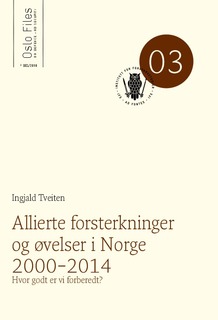Allierte forsterkninger og øvelser i Norge 2000 - 2014. Hvor godt er vi forberedt?
Research report
Permanent lenke
http://hdl.handle.net/11250/2430827Utgivelsesdato
2016Metadata
Vis full innførselSamlinger
Sammendrag
In this study, Tveiten examines the development of Host Nation Support (HNS) in Norway from 2000 to 2014, and how HNS is perceived to affect relations between Norway and its allies. Norway has a long history of providing HNS in connection with allied exercises and training in the country. The support in itself, and the standard of support rendered, are both essential to facilitate an allied presence during peace, conflict and war. It is therefore interesting to look at how HNS in Norway has developed within this time frame, and what role HNS actually plays. The analysis proceeds in two steps. First, the study describes the HNS system in Norway and its development between 2000 and 2014. This development is described on the basis of four dimensions: formal framework, priorities, organisation, and actual use, and primarily with the help of document studies. Second, the study discusses the impact of HNS on relations between Norway and its allies. This part is based on interviews with key personnel in Norway, the US, the UK and the Netherlands. Finally, the two approaches are compared in order to analyse any links between them. Tveiten shows the rhetoric versus practice concerning the importance of HNS in Norway. He also explains the Norwegian and allied perspectives on the importance of HNS.
